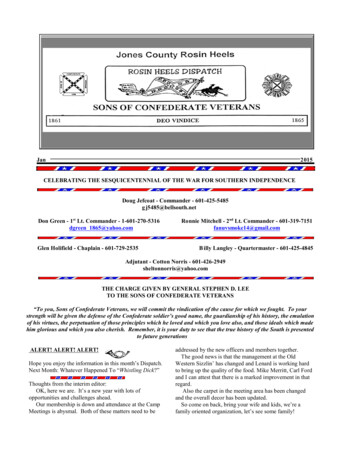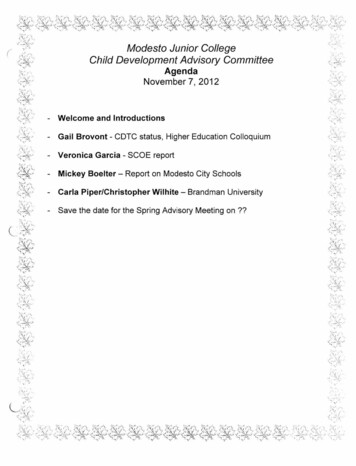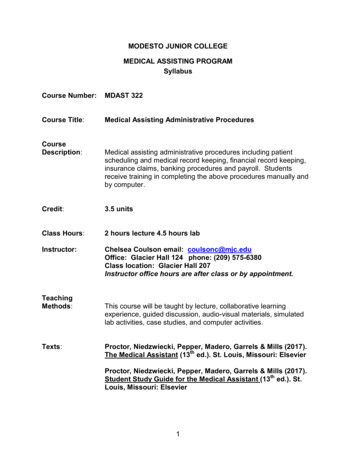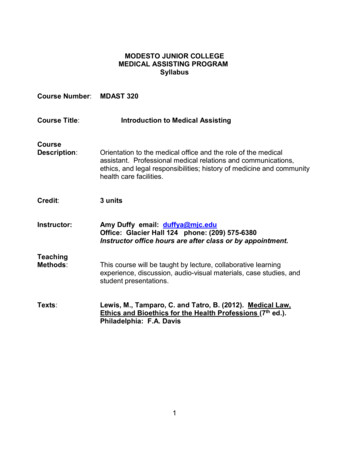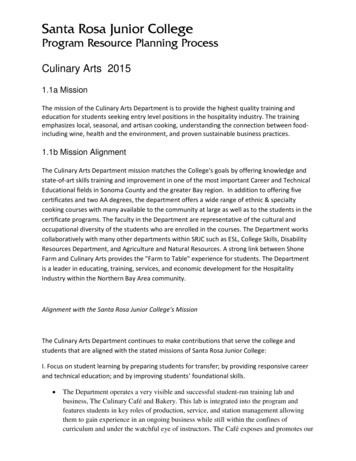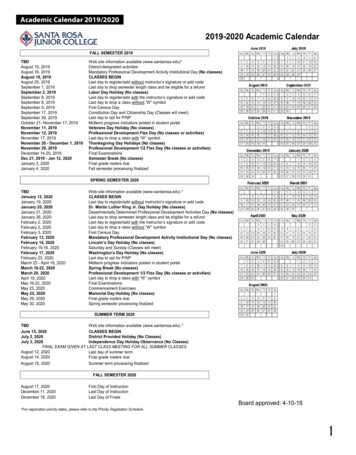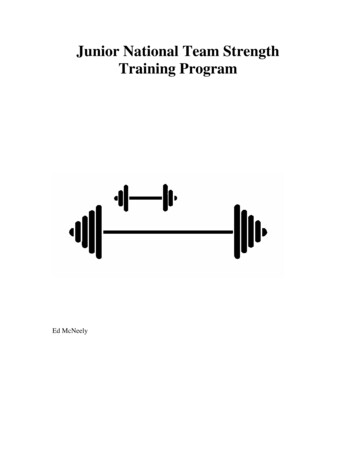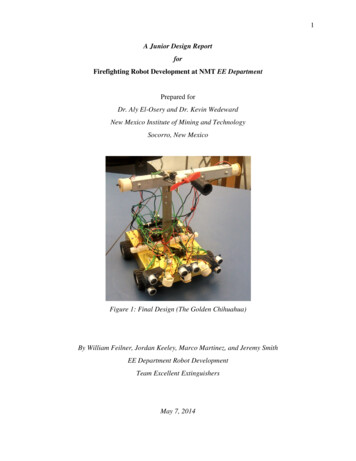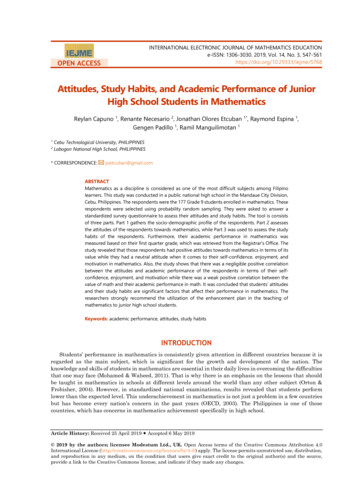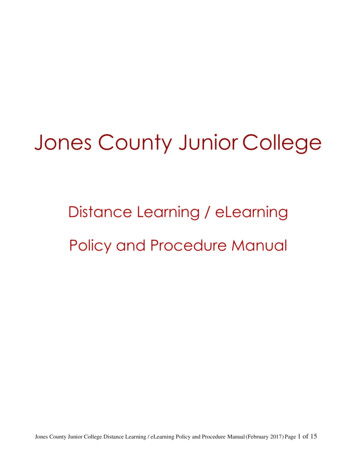
Transcription
Jones County Junior CollegeDistance Learning / eLearningPolicy and Procedure ManualJones County Junior College Distance Learning / eLearning Policy and Procedure Manual (February 2017) Page 1of 15
eLearning OvervieweLearning is defined as a formal educational process in which the majority of the instruction occurswhen student and instructor are separated by time and/or location.Jones County Junior College is an active participant in the Mississippi Virtual Community College(MSVCC). The MSVCC is a cooperative of Mississippi’s 15 community/junior college districts and theMississippi Community College Board that offers internet- based courses. These 15 institutions shareresources so that students at any one of these institutions may take internet- based courses from anymember of the consortium while receiving support services from the local college. The local collegesupports the student with a full slate of student services, including advisement and counseling,financial aid, and learning resources. The remote college provides the course and instruction;however, the local college awards the credit for the course. Students admitted to Jones County JuniorCollege may register in any of the courses that Jones hosts (internet- based courses taught by otherconsortium members). Restrictions for hosted courses states that the course must be listed in thecourse descriptions section of the Jones catalog.Purpose and Goals of eLearningThe mission and purpose of Jones County Junior College eLearning is to provide quality developmentand implementation of eLearning courses and ensure quality delivery of instruction through electroniclearning management systems to enable students to attain their educational goals. The eLearningprogram will insure that the programs and courses offered via distance technology foster studentlearning, access and success, and encourage and maintain academic excellence. Instructional Services Goals: The eLearning Program will provide online learning environmentsthat foster change in the individual; are not bound by the constraints of time and place; arecollaborative in the MSVCC Consortium; are creative with electronic delivery; are driven bylearner need; have measurable, predictable outcomes; provide quality online coursescomparable to traditional delivery; and engage learners in an active mode.Student Support/Service Goals: eLearning at Jones will continually strive to develop, modify,and improve procedures for providing satisfactory support services to distance learners in areassuch as testing, admissions, registration, counseling, library services, financial aid, and advisingusing such means as email, telephone, web pages, and mail.Fiscal, Growth, and Finance Goals: The eLearning Program will provide quality administration,sufficient facilities and equipment, and appropriate financial management to support themission of the college. To evaluate periodically and comprehensively every facet of theeLearning program and to use these results to restructure and improve the program to ensuredistance learners will be retained at the same or higher rate than traditional student enrollmentand success rate.Professional Faculty/Human Resources Goals: The division of eLearning will provideprofessional development that demands the highest professional teaching standards forteaching via the Internet; encourages continuing growth development, technology trainingamong faculty; and recognizes the importance of faculty participation in the institution’seLearning program.Jones County Junior College Distance Learning / eLearning Policy and Procedure Manual (February 2017) Page 2of 15
Policies and ProceduresEducational ProgramsQuality of CourseseLearning courses are comparable to traditional campus-based courses in terms of:(1) syllabi, (2) textbooks, (3) grading, (4) methods of evaluation, and (5) learning outcomes.Jones County Junior College course syllabi and course evaluations are reviewed on an annualbasis by instructors and Office of eLearning for accuracy and appropriateness and revised asneeded.MSVCC Core Content FileContent for each Jones County Junior College eLearning course is supplied to the MSVCC CoreContent File for the purpose of verifying content among MSVCC courses as well as against theJCJC traditional on-campus courses.Course ReviewA course review will be conducted for each first-time instructor and each new course. Criteriawill include but not limited to student satisfaction, student learning outcomes, and studentretention.In order to ensure a thorough and complete evaluation of both the educational content andappropriateness of the eLearning medium, the following process will be used:1. Faculty wishing to develop or conduct courses must submit a syllabus outlining objectives,grading policy, online activities, and methods for communication between instructor/studentand student/student to the Department Division Head and the eLearning Office.2. Once approved for development, the instructor/developer will receive additional support anddevelopment assistance from the eLearning office to include medium specific requirementsand design elements.3. All aspects of course development must be completed prior to submission to the MSVCCmaster schedule and must meet the same quality standards as traditional, campus-basedcourses.Ownership of Material/CopyrightJones County Junior College reserves the exclusive right of ownership of all electronic courses,documents, programs, curricular, etc. developed under the auspices of the college. Noestablished JCJC internet course material may be transferred to any outside entity in part or as awhole. Each instructor will sign an agreement of ownership prior to teaching online course(s).(Appendix C)Advertisement of MSVCC CoursesAll courses of the MSVCC are presented/advertised each semester to students registeringthrough Jones County Junior College.Accessibility (ADA)ADA compliance for online courses will be applied via a prudent method of providing alternatecontent, which meets the needs of a specifically challenged learner.Jones County Junior College Distance Learning / eLearning Policy and Procedure Manual (February 2017) Page 3of 15
CanvasThe MCCB has a contract with “Canvas” to provide both a platform for a class via a websiteand the server itself that houses that website. The URL for the Jones County Junior CollegeCanvas site is http://jcjc.instructore.comSUPPORT SERVICESAdmissionseLearning students are held to the same admission standards as traditional students and mustfollow the same process for enrollment at Jones County Junior College . Students may apply foradmission, register for classes, and pay tuition fees without coming to campus. Admission formsare available online http://www.jcjc.edu/new2jones.php and must be mailed, faxed, or personallybrought to the Office of Admissions in the Administration Building. Students may also applyonline at https://jcjc.edu/onlineapplication/After meeting all the admissions requirements, the student will be mailed an acceptance letter.Within the acceptance letter a student generated ID will be listed.RegistrationStudents who wish to register for eLearning courses should (1) consult with an advisor and (2)view the online course offerings on the eLearning website athttp://www.jcjc.edu/elearning/index.php. Contact the Student Success Center at 601.477.4257to speak to a counselor and register for classes or contact the eLearning Office @ 601.477.5454.There is an additional fee for online classes – each online course costs 30.00 and is included inyour tuition and is covered by Financial Aid.AdvisingJones County Junior College recognizes the importance of a thorough program of academicadvising. While it is ultimately the responsibility of the students to select and follow a programof study which will lead to their academic objectives, the College provides a structure ofacademic advising to assist students.The role of the faculty adviser is 1) to assist in planning the class schedule, 2) to provide up-todate information about careers, 3) to refer students to the proper sources for assistance, 4) toencourage students in their efforts to be successful, and 5) to approve academic programs forgraduation.Students are encouraged to contact their adviser anytime they need assistance. The adviser isavailable to meet periodically with the student during each semester via email, phone, or inperson. Students considering an eLearning course are encouraged to self-assess their technologypreparedness by completing the “READI Assessment” available via the ELearning website anddiscuss the results with their advisor, counselor or the eLearning s County Junior College Distance Learning / eLearning Policy and Procedure Manual (February 2017) Page 4of 15
Financial AidFinancial Aid information, scholarships, qualifications and applications are available to allstudents through the college website http://www.jcjc.edu/financialaid/ Financial Aid supportservices may be accessed by visiting the financial aid office in the Administration Building, orby phone at 601.477.4040.Student RecordsA transcript will be issued only upon a written and signed request from the student. Studentsmay request transcripts by presenting a signed transcript request to the Admissions Office bycalling 601.477.4025 or visiting website http://www.jcjc.edu/admissions.php.Student Disability Services (ADA)The ADA office serves as an advocate for students with disabilities and assists them in achievingequal access to all college programs and services and is available through the Jones CountyJunior College.All students with a disability, including eLearning students, are strongly encouraged to contactthe ADA Compliance Officer Ms. Pam Brownlee in the Student Success Center at601.477.4000 to discuss their disability and appropriate accommodations. Students must selfidentify in order to receive accommodationsBased on the specific nature of each student’s documented disability, the plan may include but isnot limited to the following adjustments such as; Assertive Technology, Peer Tutoring, Readers,Individualized Testing, Special Registration, Counseling, Study Skills Assistance, TextEnlargement, Any Other Reasonable Accommodations.Student Complaints/Grievance ProceduresJones County Junior College and its Board of Trustees, administration, faculty, and staff shallcontinue its policy on nondiscrimination as related to the acts of discrimination (Title VI),sexual harassment (Title IX), or violation of the rights of the disabled (Section 504 of theRehabilitation Act of 1973). Any student who believes that he/she has been discriminatedagainst by the College under the terms of Title VI, Title IX, or Section 504 of the RehabilitationAct may file a complaint as follows:Students with a grievance again faculty or staff should first attempt to resolve the matter with theindividual involved. If for some reason resolution of the grievance is not possible, the studentshould make his/her grievance known to the immediate supervisor of the individual againstwhom the student has a grievance in order to seek informal resolution of the problem. If thegrievance cannot be solved informally, the student shall present a written, signed statement of thegrievance to the Dean of Students who will schedule a meeting of the Grievance Committee.The Dean of Students will notify the student of the date and location of the Grievance Committeehearing. Refer to the Student Handbook for further information regarding student grievances.Attendance/AbsenceJones County Junior College is a member of the Mississippi Virtual Community College(MSVCC). This allows students to take online courses that are taught by Jones County JuniorCollege instructors (provided courses), as well as courses that are taught by instructors from theother community colleges (hosted colleges). Each college will have its own absence policy. AtJones County Junior College Distance Learning / eLearning Policy and Procedure Manual (February 2017) Page 5of 15
the beginning of the course, the instructor must communicate with the student by documentedclass policies his/her expectations regarding the format and frequency of class participation.Absence policy for online courses provided by Jones County Junior College instructors: Onlineinstruction differs fundamentally from traditional classroom instruction in that the student mayaccess the online resources at times that are convenient to the student’s personal schedule withina range of times defined by the instructor. However, consistent attendance is required tosuccessfully complete an online course. A student participating in a provided online course willbe allowed two (2) absences. Upon the third absence, the student will be withdrawn by theinstructor and will receive a “W” for the course unless a proper Withdrawal form is completedduring the approved withdrawal period.Attendance will be monitored by timely submission of assignments, including test, homework,projects, discussion boards, etc. A student is expected to complete all assignments by theappropriate due date. Failure to complete such assignments by the due date will be withdrawnfrom the course barring any extenuating circumstance.It is understandable that extenuating circumstances occur, such as an extreme illness, death in theimmediate family, legal matters, or military duty. It is the student’s responsibility to provideappropriate documentation in a timely manner (prior to the due date if all possible) tosubstantiate such circumstances. At which time the instructor will determine if an extension iswarranted. Students and instructors of online courses will adhere to the academic calendar andthe process of appeal.Circumstances that are NOT considered extenuating: Registering late for the class Failure to read the syllabus Failure to plan appropriately Not having the appropriate textbook or software Technical problemsWithdrawal Process (Class)Jones County Junior College strongly supports activities that promote student success in classesand degree programs. With this goal in mind the college provides a means for students towithdraw from individual classes and from the College. Students are encouraged to maintaintheir enrollment in all courses for the full semester. In cases where the academic load is too greatto maintain, the student may reduce his/her load by withdrawing from one or more classes.Students are strongly encouraged to maintain full-time status (15 hours or more) if practical. Theclass withdrawal period begins with the ninth week of class (or equivalent period in summer andintersession or eLearning) and continues up to until the 75% point for online classes.The student who desires to withdraw from online class should contact the course instructor byemail requesting the withdrawal and the reason for withdrawing. Within 24-48 hours theinstructor will complete a withdrawal form for the student which will be process by theeLearning office. Students who stop attending class run the risk of not being withdrawncorrectly and could receive a grade for the class.Jones County Junior College Distance Learning / eLearning Policy and Procedure Manual (February 2017) Page 6of 15
Student Retention Rates for VirtualStudent success is a primary goal of JCJC. While all students are awarded the same educationalopportunities, the College also realizes that registering students who are academicallyunprepared for online classes is not in the students’ best interests. Students must have an ACTscore of 16 or above, or who have successfully completed the College Readiness Program inorder to take online classes.Academic Honesty PolicyAcademic honesty is a fundamental attribute of higher learning. Students who violate theprinciple of honesty deny themselves an opportunity to master the skills that they are credited topossess, cheat their classmates of deserved recognition, and demean the college and its degrees.It is a matter of great concern that all members of the college community strive for highstandards of personal integrity.Evaluation of each student’s level of knowledge and understanding is a vital part of the teachingprocess, and requires tangible measures with the process of evaluation by misrepresenting therelationship between the work being evaluated and the student’s actual state of knowledge is anact of academic dishonesty. These acts of dishonesty include but are not limited to: fraud,cheating, plagiarism, forgery, and facilitating dishonesty.Procedure for Violators1. Students in violation of Jones County Junior College’s academic honesty guidelines areimmediately accountable to the instructor of the course. The instructor has the authorityto reduce the student’s grade or assign a grade of “F” for the exercise or examination.2. In extreme cases of academic dishonesty, the division head and instructor may elect topursue formal disciplinary action by providing a written summary of the incident to theDean of Instruction. The Dean of Instruction will review the incident report, consider theseriousness of the event and refer the matter to the Academic Discipline Committee ofthe college if appropriate.Proctored TestingJones County Junior College uses proctored exams to ensure the integrity of student work. AllJones County Junior College provided courses must administer a minimum of two proctoredexams during the semester, but not more than three proctored exams. If an instructor wishes notto administer two proctored exams, he/she must receive approval from the Director ofeLearning.Secured proctored testing lab is located in the Proctor Testing Center in Academic SupportBuilding. Students may test at any of the MSVCC Testing Centers in the state of Mississippi.Students may schedule an appointment for the JC Proctor Testing Center via the php at no cost to the student.In addition, out of district students may make their own testing arrangements. Thesearrangements must be approved at least ten business days in advance by the Office of eLearning.The Application for Off-Campus Proctor may be obtained by contacting the eLearning officelocated in Academic Support Building, via email online@jcjc.edu, or may be downloaded fromthe college’s eLearning sproctorrequest.pdf. Any costs incurred for studentarranged tests are the responsibility of the student.Jones County Junior College Distance Learning / eLearning Policy and Procedure Manual (February 2017) Page 7of 15
BookstoreBookstore information is provided on the college’s website: http://www.jcjc.edu/bookstore.phpThe Jones County Junior College Bookstore provides textbook for those course that are taught byJones County Junior College instructors through the Jones County Junior College Bookstore oronline at http://www.jcjc.edu/bookstore.php.The student may secure the textbook for a class taught by another college through the JCJCBookstore http://www.jcjc.edu/bookstore.php. Contact the Bookstore Manager at 601.477.4108for off campus book information.Library ResourcesThe college ensures that students participating in eLearning programs have access to adequateand appropriate learning resources. Learning recourses are provided through a variety ofmethods including the college’s participation in statewide online learning resource cooperativesincluding MAGNOLIA and MELO. Library’s website: http://www.jcjc.edu/library/index.html.Information for using these resources is provided online. The library monitors the effective useof these resources by students and faculty.The library provides remote access to online databases. These databases allow students toconduct necessary research for their courses. Additional reference assistance is availablethrough e-mail links on the library web page, by telephone, or FAX. Also available to students,is a 24
to speak to a counselor and register for classes or contact the eLearning Office @ 601.477.5454. There is an additional fee for online classes – each online course costs 30.00 and is included in your tuition and is covered by Financial Aid.
